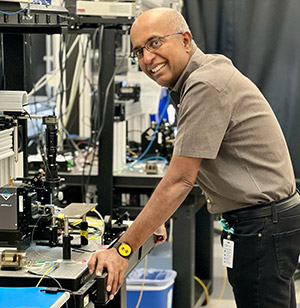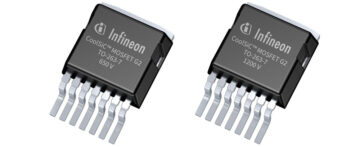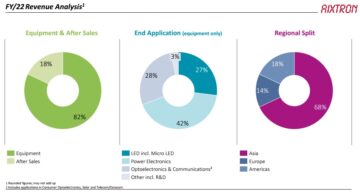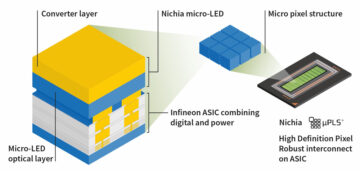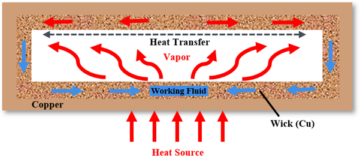News: Microelectronics
15 March 2024
The UK has joined the European Union’s ‘Chips Joint Undertaking’ as a participating state, giving British semiconductor researchers and businesses enhanced access to a €1.3bn fund set aside from Horizon Europe (the European Union’s scientific research initiative) to support research in semiconductor technologies over 2021-2027.
Access to the one of the Chips Joint Undertaking’s funds is being backed by an initial £5m this year from the UK Government’s Department for Science, Innovation and Technology (DSIT), and delivered by the agency Innovate UK (which provides funding and support for business innovation as part of UK Research and Innovation). An additional £30m is due to support UK participation in further research between 2025 and 2027.
“Our membership of the Chips Joint Undertaking will boost Britain’s strengths in semiconductor science and research to secure our position in the global chip supply chain,” said Saqib Bhatti MP, Parliamentary Under-Secretary of State for Tech and the Digital Economy in the DSIT, while announcing the move at the Global Semiconductor Alliance (GSA) International Semiconductor Conference in London (13–14 March).
This follows the UK joining Horizon Europe through a bespoke new agreement with the EU last year. The program is giving UK companies and research institutions opportunities to lead global work to develop new technologies and research projects, in areas from health to artificial intelligence (AI). Tens of thousands of UK companies are now eligible for Horizon Europe grants, which are worth £450,000 to a business, on average.
“We are looking forward to working with the UK partners to develop the European industrial ecosystem in microelectronics and its applications, contributing to the continent’s scientific excellence and innovation leadership in semiconductor technologies and related fields,” says Chips JU executive director Jari Kinaret.
It is reckoned that, this year, the Chips Joint Undertaking fund is well aligned to UK research expertise. In 2024, it includes two focused calls for funding bids on semiconductors for cars and other vehicles as well as RISC-V, an open-source architecture that aims to accelerate semiconductor innovation by lowering the cost of chip design. It also provides more open opportunities for scientists and firms to bid for research support.
“UK Semiconductor startups have a rich history of collaboration with the European Union. Our semiconductor research base is the fourth largest in the world,” notes Sean Redmond, managing partner at SiliconCatalyst. “Commercializing these inventions with the help of the EU Chips Joint Undertaking will significantly increase their probability of success, mitigating risks by local collaborations that provide a clear path from lab to fab,” he adds.
Joining the Chips Joint Undertaking initiative as a ‘participating state’ allows the UK to collaborate more closely with European partners on semiconductor innovation, with a role in setting research priorities and funding decisions as the fund evolves in the years ahead. This includes the opportunity for the UK to be a part of a new funding opportunity with the Republic of Korea to research ways to combine semiconductor chips to improve performance through advanced packaging – which the UK-Republic of Korea Semiconductor Framework, signed in November 2023.
British research has elsewhere pushed semiconductor technology forward in fields like silicon photonics and compound semiconductors.
Participation in the EU Chips Joint Undertaking will “enable us to work with key EU partners to advance and commercialize high-voltage power electronics we develop within the IKC [Innovation and Knowledge Centre] REWIRE, as well as high-power, high-frequency RF technology we develop within UK, US and European Space Agency (ESA) programs,” says Martin Kuball, chair of the Royal Academy of Engineering in Emerging Technologies, professor in physics at the UK’s University of Bristol, and director of the Centre for Device Thermography and Reliability.
This follows DSIT and UK Research and Innovation investing £22m in two Innovation and Knowledge Centres in Southampton and Bristol, aimed at reinforcing these key areas of British research. These centers are dedicated to advancing chip technologies such as silicon photonics and compound semiconductors toward commercialization.
“CSconnected, the organization representing the South Wales Compound Semiconductor sector, warmly welcomes the news that the UK is to join the EU Chips Joint Undertaking,” comments CSconnected’s director Chris Meadows. ”Collaboration is at the very heart of our fast-growing and rapidly evolving semiconductor sector that underpins technologies of today and is key to enabling our future connected world, AI, robotics, and in meeting global net-zero ambitions,” he adds.
Joining the EU Chips Joint Undertaking “opens up opportunities for UK companies to compete with our European peers on a more level playing field,” believes Jen Walls, CEO of Scotland-based Clas-SiC Wafer Fab Ltd. “The UK has a lot to offer in this sector and we are grateful as this will foster a more supportive environment for innovation,” she adds.
“Semiconductors are critical to the UK’s economic and national security. They underpin crucial technologies such as advancement in AI,” says Vaysh Kewada, founder & CEO of Salience Labs. “The UK produces world-leading research in silicon photonics, compound semiconductors and others. This government support is a good step forward to foster growth and to ensure that the UK remains relevant in the critical technologies of tomorrow,” she adds.
“This is an excellent opportunity for UK researchers and businesses to strengthen links with our EU partners and collaborate on cutting-edge semiconductor projects of national importance,” believes Martin McHugh, CEO at CSA Catapult. “Access to the Horizon Europe funds will enable the UK to partner on projects where we have mutual and significant strengths, such as design, advanced packaging and compound semiconductors,” he adds.
“Semiconductors are at the base of core technologies that can solve important societal challenges, among which net-zero and electrification, and significant advancements in the field can be achieved only thanks to collaborative efforts and government support,” concludes Dr Giorgia Longobardi, founder & CEO of Cambridge GaN Devices.
The deadline for Phase 1 applications this year is 14 May. Chips JU executive director Jari Kinaret is providing an online information session at 1pm on 19 March. Sign-up is available via this link. Innovate UK is also hosting an information session on the 25 March.
UK unveils National Semiconductor Strategy, with £1bn government funding
Power electronics silicon photonics
- SEO Powered Content & PR Distribution. Get Amplified Today.
- PlatoData.Network Vertical Generative Ai. Empower Yourself. Access Here.
- PlatoAiStream. Web3 Intelligence. Knowledge Amplified. Access Here.
- PlatoESG. Carbon, CleanTech, Energy, Environment, Solar, Waste Management. Access Here.
- PlatoHealth. Biotech and Clinical Trials Intelligence. Access Here.
- Source: https://www.semiconductor-today.com/news_items/2024/mar/euchipju-150324.shtml
- :has
- :is
- :where
- $UP
- 000
- 1
- 14
- 19
- 2023
- 2024
- 2025
- 25
- a
- Academy
- accelerate
- access
- accessing
- achieved
- Additional
- Adds
- advance
- advanced
- advancement
- advancements
- advancing
- agency
- Agreement
- ahead
- AI
- aimed
- aims
- aligned
- Alliance
- allows
- also
- ambitions
- among
- an
- and
- Announcing
- applications
- architecture
- ARE
- areas
- artificial
- artificial intelligence
- Artificial intelligence (AI)
- AS
- aside
- At
- available
- average
- backed
- base
- BE
- becomes
- being
- believes
- bespoke
- between
- bid
- boost
- bristol
- British
- business
- businesses
- by
- Calls
- cambridge
- CAN
- cars
- Centers
- centre
- centres
- ceo
- chain
- Chair
- challenges
- chip
- Chips
- Chris
- clear
- closely
- collaborate
- collaboration
- collaborations
- collaborative
- combine
- comments
- commercialization
- commercialize
- Companies
- compete
- Compound
- concludes
- Conference
- connected
- contributing
- Core
- Cost
- critical
- crucial
- cutting-edge
- deadline
- decisions
- dedicated
- delivered
- Department
- Design
- develop
- device
- Devices
- digital
- Digital economy
- Director
- dr
- due
- Economic
- economy
- ecosystem
- efforts
- electrification
- Electronics
- eligible
- elsewhere
- emerging
- emerging technologies
- enable
- enabling
- Engineering
- enhanced
- ensure
- Environment
- ESA
- Ether (ETH)
- EU
- Europa
- Europe
- European
- European Space Agency
- european union
- eventbrite
- evolves
- evolving
- Excellence
- excellent
- executive
- Executive Director
- expertise
- field
- Fields
- firms
- focused
- follows
- For
- Forward
- Foster
- founder
- Fourth
- Framework
- from
- fund
- funding
- funds
- further
- future
- Giving
- Global
- good
- Government
- government support
- grants
- grateful
- Growth
- Have
- he
- Health
- Heart
- help
- High-Frequency
- history
- horizon
- hosting
- http
- HTTPS
- importance
- important
- improve
- in
- includes
- Increase
- industrial
- information
- initial
- Initiative
- innovate
- Innovation
- institutions
- Intelligence
- International
- inventions
- investing
- IT
- items
- ITS
- jen
- join
- joined
- joining
- joint
- Key
- Key Areas
- knowledge
- korea
- lab
- Labs
- largest
- Last
- Last Year
- lead
- Leadership
- Level
- like
- links
- local
- London
- looking
- Lot
- lowering
- Ltd
- managing
- managing partner
- March
- Martin
- May..
- meadows
- meeting
- membership
- mitigating
- mitigating risks
- more
- move
- mutual
- National
- net-zero
- New
- New Funding
- news
- Notes
- November
- now
- of
- offer
- on
- ONE
- online
- only
- open
- open source
- opportunities
- Opportunity
- organization
- Other
- Others
- our
- over
- packaging
- Parliamentary
- part
- participating
- participation
- partner
- partners
- path
- peers
- performance
- phase
- Physics
- plato
- Plato Data Intelligence
- PlatoData
- playing
- position
- power
- probability
- produces
- Professor
- Program
- Programs
- projects
- provide
- provides
- providing
- pushed
- rapidly
- related
- relevant
- reliability
- remains
- representing
- Republic
- research
- research and innovation
- Research Institutions
- researchers
- Rewire
- Rich
- risks
- robotics
- Role
- royal
- Said
- says
- Science
- scientific
- Scientific Research
- scientists
- Scotland-based
- Sean
- sector
- secure
- security
- semiconductor
- Semiconductors
- session
- set
- setting
- she
- signed
- significant
- significantly
- Silicon
- societal
- SOLVE
- South
- Southampton
- Space
- Startups
- State
- Step
- Strategy
- Strengthen
- strengths
- success
- such
- supply
- supply chain
- support
- supportive
- tech
- Technologies
- Technology
- tens
- thanks
- that
- The
- the UK
- the world
- their
- These
- they
- this
- this year
- thousands
- Through
- to
- today
- tomorrow
- toward
- two
- Uk
- underpin
- union
- university
- Unveils
- us
- Vehicles
- very
- via
- ways
- we
- Welcomes
- WELL
- which
- while
- will
- with
- within
- Work
- working
- world
- worth
- year
- years
- zephyrnet


